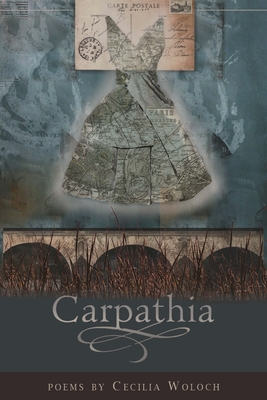Cecilia Woloch is a poet I like a lot, and it's not just because she's a Polish-American and she writes about Poland, and it's not because she's probably done as much in recent years as Janusz Zalewski to bring Polish and American poets together.

I like Cecilia Woloch because her poems touch me. Years ago, I wrote a short
blog piece about the poems I like to read, good poems, and here's part of what I wrote:
"Someone asked me recently how I know what is good poetry and what isn't. There is the long story of what is good and the short story of what is good. The long story involves criteria and personal biography, the short story involves a simple statement. I'll give you the short story. What I feel is 'good' is what touches me."
Cecilia's new book
Carpathia touches me.
I grew up hearing stories about the lives of people who started with nothing and ended up with nothing and spent most of their lives working for something, anything, that would feed the hunger that nothing brings. Sometimes they would find something and it would bring them joy. And sometimes it would bring them sorrow.
But the stories they told were never about the sorrow. They were about the search for joy or wisdom or friendship or love or honor that left the sorrow behind.

Cecilia's poems are like those stories. They takes you by the hand and ask you to rest and breathe and listen to the songs in the wind, the voices from the past and the voices from faraway telling you their stories.
Her book is full of such stories, and here are two I really really like, "Anniversary" and the title poem "Carpathia."
ANNIVERSARY
Didn’t I stand there once,
white-knuckled, gripping the just-lit taper,
swearing I’d never go back?
And hadn’t you kissed the rain from my mouth?
And weren’t we gentle and awed and afraid,
knowing we’d stepped from the room of desire
into the further room of love?
And wasn’t it sacred, the sweetness
we licked from each other’s hands?
And were we not lovely, then, were we not
as lovely as thunder, and damp grass, and flame?
CARPATHIA
Having rinsed off the soot and stink
of the Polish train,
having sung with the child.
Having eaten and laughed and wept,
had my vodka with apple juice,
my bread.
Having walked through the fields
at dusk, and into the forest
and back again--
meadows of buttercups,
thistles with bristling heads,
the first blue cornflowers of June.
Having opened my arms to the sky
falling back on itself
in my dizziness.
Having taken the small purple berries
that dropped from the wild bush
into my palm
--Siberian berries, like tiny plums--
put their sweet bitter inkiness
onto my tongue.
Having failed and failed at love.
Having gone anyway,
breath after breath.
Having trusted the world to be kind
and stood in the doorway
and listened for wolves
and heard my own dead in the high
grass whispering,
beloved, beloved, beloved.
____________________________
Her new book is available at
BOA editions, or
Amazon.com.
You can also find out more about Cecilia at her
website or by taking a look at the other Writing the Polish Diaspora posts about her:
Woloch and Luczaj Read in Krakow and
Cecilia Woloch's New Book Narcissus.


